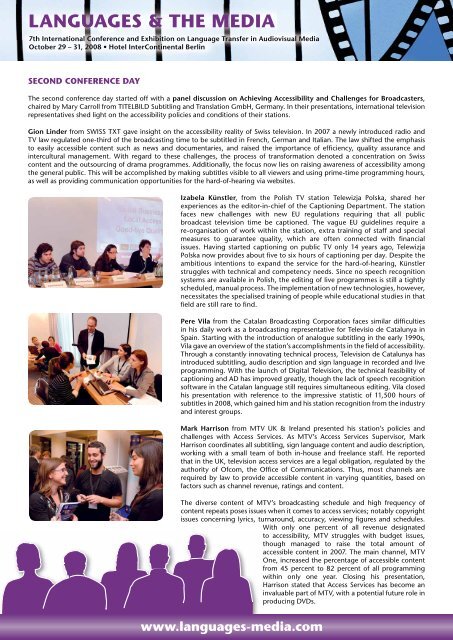Languages & The Media Post Conference Report 2008
Languages & The Media Post Conference Report 2008
Languages & The Media Post Conference Report 2008
Create successful ePaper yourself
Turn your PDF publications into a flip-book with our unique Google optimized e-Paper software.
LANGUAGES & THE MEDIA<br />
7th International <strong>Conference</strong> and Exhibition on Language Transfer in Audiovisual <strong>Media</strong><br />
October 29 – 31, <strong>2008</strong> Hotel InterContinental Berlin<br />
SECOND CONFERENCE DAY<br />
<strong>The</strong> second conference day started off with a panel discussion on Achieving Accessibility and Challenges for Broadcasters,<br />
chaired by Mary Carroll from TITELBILD Subtitling and Translation GmbH, Germany. In their presentations, international television<br />
representatives shed light on the accessibility policies and conditions of their stations.<br />
Gion Linder from SWISS TXT gave insight on the accessibility reality of Swiss television. In 2007 a newly introduced radio and<br />
TV law regulated one-third of the broadcasting time to be subtitled in French, German and Italian. <strong>The</strong> law shifted the emphasis<br />
to easily accessible content such as news and documentaries, and raised the importance of effi ciency, quality assurance and<br />
intercultural management. With regard to these challenges, the process of transformation denoted a concentration on Swiss<br />
content and the outsourcing of drama programmes. Additionally, the focus now lies on raising awareness of accessibility among<br />
the general public. This will be accomplished by making subtitles visible to all viewers and using prime-time programming hours,<br />
as well as providing communication opportunities for the hard-of-hearing via websites.<br />
Izabela Künstler, from the Polish TV station Telewizja Polska, shared her<br />
experiences as the editor-in-chief of the Captioning Department. <strong>The</strong> station<br />
faces new challenges with new EU regulations requiring that all public<br />
broadcast television time be captioned. <strong>The</strong> vague EU guidelines require a<br />
re-organisation of work within the station, extra training of staff and special<br />
measures to guarantee quality, which are often connected with fi nancial<br />
issues. Having started captioning on public TV only 14 years ago, Telewizja<br />
Polska now provides about fi ve to six hours of captioning per day. Despite the<br />
ambitious intentions to expand the service for the hard-of-hearing, Künstler<br />
struggles with technical and competency needs. Since no speech recognition<br />
systems are available in Polish, the editing of live programmes is still a tightly<br />
scheduled, manual process. <strong>The</strong> implementation of new technologies, however,<br />
necessitates the specialised training of people while educational studies in that<br />
fi eld are still rare to fi nd.<br />
Pere Vila from the Catalan Broadcasting Corporation faces similar diffi culties<br />
in his daily work as a broadcasting representative for Televisio de Catalunya in<br />
Spain. Starting with the introduction of analogue subtitling in the early 1990s,<br />
Vila gave an overview of the station’s accomplishments in the fi eld of accessibility.<br />
Through a constantly innovating technical process, Television de Catalunya has<br />
introduced subtitling, audio description and sign language in recorded and live<br />
programming. With the launch of Digital Television, the technical feasibility of<br />
captioning and AD has improved greatly, though the lack of speech recognition<br />
software in the Catalan language still requires simultaneous editing. Vila closed<br />
his presentation with reference to the impressive statistic of 11,500 hours of<br />
subtitles in <strong>2008</strong>, which gained him and his station recognition from the industry<br />
and interest groups.<br />
Mark Harrison from MTV UK & Ireland presented his station’s policies and<br />
challenges with Access Services. As MTV’s Access Services Supervisor, Mark<br />
Harrison coordinates all subtitling, sign language content and audio description,<br />
working with a small team of both in-house and freelance staff. He reported<br />
that in the UK, television access services are a legal obligation, regulated by the<br />
authority of Ofcom, the Offi ce of Communications. Thus, most channels are<br />
required by law to provide accessible content in varying quantities, based on<br />
factors such as channel revenue, ratings and content.<br />
<strong>The</strong> diverse content of MTV’s broadcasting schedule and high frequency of<br />
content repeats poses issues when it comes to access services; notably copyright<br />
issues concerning lyrics, turnaround, accuracy, viewing fi gures and schedules.<br />
With only one percent of all revenue designated<br />
to accessibility, MTV struggles with budget issues,<br />
though managed to raise the total amount of<br />
accessible content in 2007. <strong>The</strong> main channel, MTV<br />
One, increased the percentage of accessible content<br />
from 45 percent to 82 percent of all programming<br />
within only one year. Closing his presentation,<br />
Harrison stated that Access Services has become an<br />
invaluable part of MTV, with a potential future role in<br />
producing DVDs.<br />
www.languages-media.com




